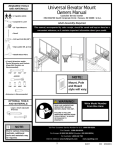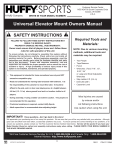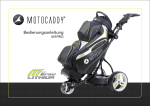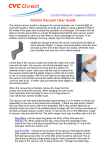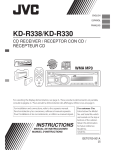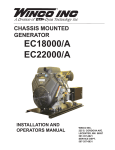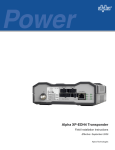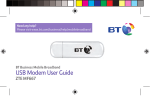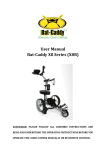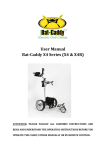Download Motocaddy S7 Remote User Manual
Transcript
S7 REMOTE Electric Trolley Instruction Manual ! Before using the S7 REMOTE for the first time, please take a few minutes to read through this manual to ensure that you get the most out of your trolley REGISTERONLINE www.motocaddy.com/warranty ! Attaching the Wheels / Attaching the Anti-Tip Wheel Locating your Serial Number Attaching the Wheels To attach the main rear wheels follow these simple steps: Locating your Serial Number The serial number for your Motocaddy trolley is located on the underside of the battery tray. This number is required when registering your warranty online and should be kept handy for future use. The same number should also be on the box received with your trolley. Please ensure you keep hold of the packaging in case you need to return your trolley for any reason. A proof of purchase must also be kept in case your trolley requires servicing during its warranty period. 1. 2. 3. 4. Push the quick release button in towards the centre of the wheel Slide the wheel on to the axle as far as it will go Release the button and pull the wheel outwards slightly to lock A small click will confirm they are in the correct position The outer groove can be used as a “free-wheel” option if you run out of battery power during a round of golf. IMPORTANT : To check you have attached the wheels correctly onto the inner groove, you will find they will not rotate freely in either direction. Attaching the Anti-Tip Wheel Please keep a record of your trolley serial number here for future reference M C S The Anti-Tip wheel is designed to prevent the trolley from tipping backwards on steeper inclines and it is recommended that the wheel is ALWAYS fitted when navigating using the remote control handset. To attach the wheel, simply lift the orange button at the rear of the battery tray (fig. 1) and slide the wheel attachment into the housing with the hole facing upwards. There will be a ‘click’ when the wheel is fitted securely in place. To remove the wheel, lift the orange button and slide the attachment out of the housing. The Anti-Tip wheel can be removed for cleaning and storage purposes. Fig 1 Page 2 Page 3 Installing Handset batteries / Fitting Handset belt clip Battery Care and Advice Installing the Remote Handset batteries The remote handset requires 3 AAA Batteries (Included with the manual). Battery Care and Advice To fit the batteries: All batteries must be charged as soon as possible after each use. 1. Remove the two screws on the back of the handset (fig 1) using a Phillips screw driver 2. Lift and remove the back cover 3. Insert the three batteries as shown (fig 2) Fig 1 Fig 2 Please ensure that only batteries supplied by Motocaddy are charged with Motocaddy chargers. Cyclic battery chargers are designed specifically in accordance with the battery manufacturer’s requirements. The Lithium battery charger MUST NOT be used to charge any other battery and is designed for use with Motocaddy Lithium batteries only. 4. Replace the back cover ensuring the top hooks in to place and secure with the two screws The charger should only be connected to an earthed socket outlet; the battery charger should only be opened and maintained by authorised personnel. Unauthorised opening will invalidate your warranty. Fitting the Remote Handset belt clip The remote handset comes with an optional belt clip. The battery must be stored and charged on a dry non-carpeted surface and charged at temperatures ranging between 10°C and 30°C. Charging above or below these temperatures is not recommended as it can reduce the battery capacity. To fit the belt clip to your handset: When connecting your battery to the trolley, please ensure that the connections match up black to black and blue to blue. 1. Remove the rubber bung by lifting it out 2. Place the clip in to the back and rotate 90˚ clockwise to secure (fig 3) Fig 3 Page 4 Page 5 Charging your Lithium Battery / Caring for your Lithium Battery Caring for your Lithium Battery Charging your Lithium Battery Recommendations for the hibernation of Lithium Batteries during Winter months 1. Unplug your lithium battery from your trolley. This should always be done before folding the trolley to avoid damage to the battery and/or trolley 2. Plug the charger into your mains supply 3. Attach the battery cable to the charger matching the black and blue connections 4. When the charging led indicator has turned green, the battery is fully charged and ready to be used If for any reason your lithium battery is not going to be used for lengthy periods, e.g. 3 months over the winter, it is advised to store the battery half charged. To do this simply use the battery for a round of golf as usual and charge it for 1.5 hours at the end of the round. Before the battery is used again, recharge it (top it up) prior to use. We recognise that extended absences are not always planned in advance, however when it is likely that you will not be using your battery for a period of time it is good practice to follow these steps to extend the life of your lithium battery. Please ensure that the charger is ALWAYS disconnected from the battery after charging. RED - Battery Charging GREEN - Battery fully charged and ready to be disconnected 5. The charging process will take between 3 to 5 hours depending on the depth of discharge (please be aware that this may take longer for the first few charges) 6. Once charging is complete please disconnect the charger from the mains power supply 7. Finally disconnect the charger from the battery Caring for your Lithium Battery • • • • Try to avoid getting the battery too wet (i.e. do not submerse the battery, try to avoid deep puddles and do not clean your trolley whilst battery is still in the battery tray) Dropping the battery may cause damage to the internal cells Do not lift or carry the battery by the cable Use a damp cloth to clean off any dirt Page 6 Lithium Battery Management System (BMS) Motocaddy Lithium Batteries are fitted with a comprehensive battery management system (BMS) to protect the battery from excessive abuse, high currents, deep discharge and overcharge. When the battery is delivered there may be no output as the BMS is designed to maximize safety whilst shipping. Please ensure that the battery is fully charged prior to connecting it to your trolley as this will activate the BMS and effectively “switch-on” the battery. From time to time, at deep discharge or long term storage the BMS may switch-off the battery. A full battery charge will rectify this problem. Motocaddy golf trolleys are designed to work with the BMS system installed in the Lithium batteries and the voltage meter is also synchronised to work in conjunction with the battery. If for any reason the voltage on the battery reaches that below the low battery warning on the trolley, then the BMS may disable the battery to protect it. Again if this occurs please recharge fully. Please be aware that Lithium batteries tend to “drop off” quickly at the end of the cycle so it is not advisable to attempt to play excessive holes as the BMS will activate for protection purposes. Page 7 Unfolding your Trolley Folding your Trolley This Motocaddy trolley is fitted with the QUIKFOLD system, allowing you to fold and unfold it quicker than ever before. Folding your Trolley Unfolding your Trolley 1. Make sure your battery is unplugged before folding 2. Ensure that the upper bag support has been folded up 1. Press and hold the upper QUIKFOLD release button (fig. 1) 3. Press and hold the lower QUIKFOLD release button (fig. 1) 2. Lift the handle and release the button 4. Lower the main frame (fig. 2) and release the button 3. Unfold the upper frame section fully (fig. 2) 4. Lift the main frame from the central hinge using the section marked “Hold Here” until the QUIKFOLD lock clicks into position (fig. 3) 5. Fold the handle towards the front wheel until the QUIKFOLD system clicks into position (fig. 3) You may need to gently push as indicated if you do not hear a click (fig. 4). 5. Unfold the upper bag support PLEASE NOTE : Do not lift from the handle (step 4 above) as this will complicate the folding process. Fig 1 Page 8 Fig 2 Fig 3 Fig 1 Fig 2 Fig 3 Fig 4 Page 9 Using the Lower Bag Supports Using the Upper Bag Supports / Adjusting the Bag Supports Using the Upper Bag Supports Using the Lower Bag Supports The upper bag support straps can be secured using the same steps as the non-EASILOCK instructions overleaf: This Motocaddy trolley is fitted with the new EASILOCK™ bag attachment system. If you are using an EASILOCK™ compatible cart bag please follow these simple instructions: 1. Remove the two pre-fitted lower bag straps by depressing the rear button and sliding (fig. 1) Fig 1 Fig 1 2. Loop the rounded bar underneath the hook (fig. 2 left) 2. Match up the indicating line on your cart bag with the line on the lower bag support 3. Position the two placement straps centrally on your cart bag (fig. 3 left) 3. Lower bag until the pins lock in position Adjusting the Bag Supports If you are using a non-EASILOCK™ bag, please use the following instructions: The bag support straps are manufactured from elasticated material to allow your golf bag to be held tightly in place. 1. Stretch the elasticated strap around the bag 2. Loop the rounded bar underneath the hook (fig. 2) 1. Stretch the elasticated strap around the bag Fig 2 The strap should be adjusted to be reasonably tight around the golf bag: 3. Position the two placement straps centrally on your cart bag (fig. 3) 1. Unclip the elasticated straps from the housing by pulling outwards in the direction shown by the arrows (fig. 1) Please ensure the straps are hooked in place securely before releasing. Failure to do so could result in injury to the user. 2. Move the bar as required to tighten or loosen the strap fitting. Pulling the bar downwards will tighten, pushing it upwards will loosen (fig. 2) Fig 2 3. Ensure that the straps are clipped back in to the housing before use (fig. 3) Fig 3 Page 10 Fig 3 Page 11 Safe use of your Trolley Safety Features / Caring for your Trolley S7 REMOTE safety features Safe use of your Trolley • The following is not intended to cover all possible situations. Caution and common sense should always be used when operating the S7 REMOTE The S7 REMOTE trolley is fitted with safety cut off features. Whilst operating the trolley via the remote control, if no command is sent to the trolley (any buttons pressed) for longer than 45 seconds, the trolley will cut power to the motors. Whilst moving, if the trolley travels out of range of the remote control, the trolley will also cut power to the motors. • Your Motocaddy trolley is designed for the transportation of golf bags and clubs contained within. Using the trolley for any other reason may cause damage to the trolley and cause harm to the user Whilst operating the trolley in manual mode, if no adjustment to the speed is made via the dial for longer than 75 seconds, the trolley will cut power to the motors. • Do not attempt to transport any other equipment If any of these safety features initiate, simply press the ‘Pause/Resume’ button to continue using the trolley. • The trolley is not designed for the transportation of people Caring for your Trolley • Do not use the trolley to assist you when going up hills • Never aim the S7 REMOTE at other people or golf trolleys • Submerging the trolley in water (eg a lake) is likely to cause damage to the trolley • Do not operate the trolley whilst under the influence of drugs or excessive amounts of alcohol • The battery must be disconnected from the trolley before transporting Although your Motocaddy Trolley has been weatherproofed, please follow these simple guidelines to help protect your trolley: • • • • • Do not store your trolley outside Try to minimise exposure to rain as much as possible with an umbrella during heavy rainfall Wipe excess water from the trolley prior to storage Never use a pressure washer to clean your trolley. To prevent water damage, wipe it down with a damp cloth Avoid using high pressure air hoses near moving components • When using the S7 REMOTE in confined spaces (for example car parks) or near water (such as over bridges) it is advisable to use the ‘Manual’ control mode to ensure that you remain in control of the trolley This Motocaddy trolley is designed to require very little maintenance; we do however recommend giving your trolley regular checks to ensure: • Never let the S7 REMOTE run out of your sight. Always use proper care and control • • • Motocaddy cannot take responsiblilty for any damage or injury caused from improper use There is no build up of excess mud and dirt The front wheels are not clogged up and turn freely Only original Motocaddy parts should be used when repairing your trolley. Page 12 Page 13 S7 REMOTE Equipment Overview Remote Control Overview 1 S7 REMOTE Equipment Overview 1. Digital Control Panel 2 2. Upper Bag Support 13 3. QUIKFOLD Upper Release Button 3 4. QUIKFOLD Lower Release Button 2. Function Button 6. Rear Wheel Release Button 8. Battery 7 3. Plus (+) Button 4 11 4. Minus (-) Button 8 5. Left (<) Button 9. Battery Tray 10. Motors (located under Battery Tray) 11. Front Wheels 5 9 6 4 1 2 6. Right (>) Button 15 13. USB Charging Port 10 14. Anti-Tip Wheel Page 14 5 7. Indicator LED 12 12. Battery Connector 15. Ant-Tip Wheel Release 3 1. Pause/Resume Button 5. Rear Wheels 7. EASILOCKTM Lower Bag Support 7 Remote Control Overview 14 6 Page 15 Using the S7 REMOTE / Power and Battery Level Operating the trolley using the Remote Control handset Using the S7 REMOTE trolley The first time you use the S7 REMOTE, we would advise using it on an open area of grass. The trolley speeds and steering characteristics will vary depending on the surface. The S7 REMOTE will turn much quicker on hard, smooth surfaces and will behave differently on grass. You will also find that the weight of the golf bag will affect both speed and steering. Power and Battery Level There are two LED indicators located below the main display. These will illuminate when the battery is plugged in. The left LED will display green to indicate that the trolley is under power. It will then flash red when the trolley receives a signal from the remote control. Operating the trolley using the Remote Control handset To start the trolley moving for the first time, press the ‘Plus (+)’ button on the remote control handset. The ‘Plus (+)’ and ‘Minus (-)’ buttons can then be used to increase and decrease the speed to the required pace. The trolley can be stopped and restarted by pressing the ‘Pause/Resume’ button. It is not necessary to reduce the speed before stopping, however it is important to remember that the trolley will restart at the previously set speed. The ‘Left (<)’ and ‘Right (>)’ buttons are used to steer the trolley and incorporate dual pressure sensitivity to provide responsive navigation. A light pressure will offer a gradual adjustment in direction and a firmer pressure will result in an increased degree of turn. The indicator light on the remote control changes depending on the amount of pressure applied. Lighter pressure will show a green LED and firmer pressure will show a red LED. Checking the indicator light during the first few uses will help you get used to the two levels of steering. When the trolley is stationary, pressing the ‘Minus (-)’ button will put the trolley into reverse. Whilst reversing, pressing the same button will increase the speed and the ‘Plus (+)’ button will slow it down. The right LED displays the battery capacity (green & red). Press the ‘Pause/Resume’ button to stop the trolley. The trolley is designed to protect the battery from being fully discharged. If the battery capacity drops too low, the trolley will cut power to the motors. This will be indicated by a “b” on the screen and the right LED flashing red. It is recommended to operate the trolley at slower speeds whilst reversing. Page 16 Page 17 Pairing the Remote Control / Operating the trolley using Manual Control mode Using the Tilt Compensation feature / Setting Tilt Compensation Pairing the Remote Control Using the Tilt Compensation feature In the unlikely event that the remote is not responding or you have a new remote handset, it will need to be paired to the trolley. The S7 REMOTE is fitted with an innovative tilt compensation feature which helps keep the trolley running in a straighter line whilst traversing slopes. This will reduce the amount that the trolley pulls down the slope. By default, the tilt compensation feature is disabled and can easily be enabled. It is advisable to try using the trolley first before enabling the tilt compensation. To pair the remote to the trolley: 1. Press and hold the ‘Speed dial’ on the handle whilst plugging in the battery 2. When “P” is displayed on the screen (fig. 1), release the button 3. Press the ‘Function’ button on the remote handset Fig 1 Operating the trolley using Manual Control mode Setting the Tilt Compensation default level When required, the S7 REMOTE trolley can be switched to manual mode and operated using the speed dial on the handle. Fig 2 It is possible to perform a factory reset on the tilt compensation to instruct the trolley what level ground is. This MUST be performed on a completely flat and level surface. Fig 2 1. Hold down the ‘Speed dial’ on the handle for 10 seconds until “F” (fig. 2) is displayed 2. Release the button In manual mode the trolley has 9 speed settings (1 to 9) with 1 being the slowest setting and 9 the fastest. To increase the speed, rotate the speed dial clockwise, or anti-clockwise to decrease the speed. It will take a few seconds to register and a series of lines will move up the display (fig. 3) to indicate that calibration is underway. To start the trolley, simply select your required speed setting and press the button. The trolley will smoothly accelerate until it reaches the selected speed. To stop the trolley, simply press the button again - there is no need to reduce the speed setting. It is important that you do not touch the trolley until the lines have stopped moving and the factory reset is complete as it may affect the calibration. Press any button on the remote control handset to return to remote mode. Fig 3 Page 18 Fig 1 To enable/disable the tilt compensation feature, hold down the ‘Function’ button and the ‘Pause/ Resume’ button simultaneously for 3 seconds. The decimal point will appear/disappear to indicate that it has been enabled/disabled. The handle display will show an “r” (fig. 2) to indicate that pairing has been successful. To switch to manual mode, press the speed dial until the display changes from “r” to “4” (fig 3). This indicates that manual mode has been initiated. The tilt compensation status is indicated by the decimal point shown on the display (fig. 1). If the decimal point is showing, the tilt compensation feature is enabled, if it is not displayed then it is disabled. Fig 3 Page 19 Using the Trim function to reduce veering Using the USB Charging Port Using the Trim function to reduce veering The trim function on the S7 REMOTE trolley can be used to rectify veering caused by factors such as uneven weight distribution of the bag. To adjust the trim, simply hold down the ‘Function’ button and press the ‘Left (<)’ or ‘Right (>)’ buttons to trim the power delivered to each motor. Pressing the ‘Left (<)’ button will compensate for a trolley veering to the right and vice-versa. During this process, the level of trim will be indicated by the green LED’s on the handle and show whether the trim is set to the left (left LED) or right (right LED). Holding down the ‘Function’ button will show the direction that the trolley is currently trimmed to. Using the USB Charging Port This Motocaddy trolley features a USB charging port designed to power GPS devices during your round. Simply remove the covering cap and plug a USB cable into the charging port located on the underside of the handle. The device will continue charging for the duration of time that the cable is attached and the battery is connected. It is important to note that the speed of charge will be lower than that of a mains AC charger and similar to plugging the device into a PC. The USB charger takes power from the main trolley battery and continuous charging will reduce the battery capacity between charges. The trolley is designed to disable the USB port when the battery capacity reaches a preset level. Please note: The trim level is not applied whilst operating at low speeds. Page 20 Page 21 Hints & Tips Declaration of Conformity Hints & Tips • Please unplug the battery when leaving the trolley unattended • The S7 REMOTE is designed for use on mown grass areas and designated pathways. Do not attempt to steer the trolley through bunkers or deep puddles. Do not try to drive the trolley down steps or high curbs • Avoid overloading your bag as extra weight will increase the consumption of the battery capacity. It will also affect the speed and steering characteristics of the S7 REMOTE. Very heavy bags will also add unnecessary strain on the motors • Keeping the S7 REMOTE to fairways will help conserve your battery. Operating the trolley through long grass and rugged terrain will increase the power consumption Page 22 Page 23 Motocaddy Ltd, Units 15 - 18 Stansted Distribution Centre, Start Hill, Great Hallingbury, Hertfordshire, CM22 7DG t: +44 (0) 1279 712 370 e: [email protected] w: www.motocaddy.com We are dedicated to protecting the environment and encourage the recycling of Motocaddy products through a free collection and disposal service. To find out more or to locate your nearest Motocaddy recycling point, please contact us through our website. MC.15.26.003















